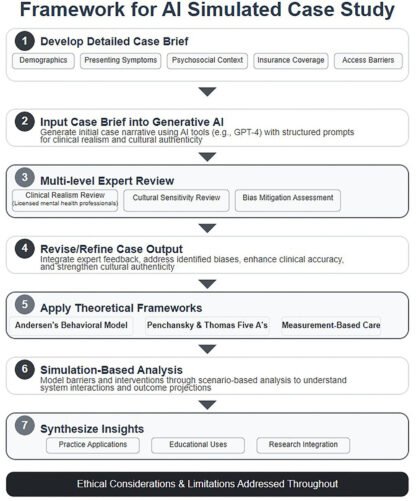Harnessing Generative AI for Personalized Mental Health Treatment
The Innovators Behind the Research
At the forefront of innovative mental health research is a team from the University of Illinois Urbana-Champaign, led by Professor Cortney VanHook. Their recent work harnesses the capabilities of generative artificial intelligence (AI) to tackle significant barriers in mental health care, particularly for diverse populations. The study is a leap toward personalized mental health treatment, giving professionals a new framework for understanding and addressing patient needs.
A Unique Case Study
The researchers created a simulated case study centering on a fictitious client named Marcus Johnson. Marcus represents a young, middle-class Black man experiencing depressive symptoms while navigating the health care system in Atlanta, Georgia. Using generative AI, the team developed a comprehensive mental health journey for Marcus, identifying both his protective factors—like supportive family relationships—and potential barriers to care, such as cultural expectations surrounding gender and the limited availability of Black male providers.
This simulation helps practitioners visualize the varied pathways individuals might take in accessing mental health care, especially concerning common access issues and demographic disparities.
Exploring Benefits Through Simulation
One of the standout benefits of adopting this simulated approach is the ability to comply with patient privacy laws. By creating a fictional character, the researchers could explore and refine potential clinical interventions without the legal risks associated with real client data. This low-risk environment promotes better training for practitioners, enabling them to better understand how to assist diverse clients effectively.
According to VanHook, real-world simulations such as this are invaluable because they allow professionals to hone their skills and improve mental health systems, leading to more equitable and responsive care.
Evidence-Based Frameworks Applied
In developing the treatment plan for Marcus, VanHook and his co-authors utilized three theoretical, evidence-based frameworks: Andersen’s Behavioral Model, a framework assessing the factors influencing health service utilization, and a five-component theory of access to care, which includes availability, accessibility, accommodation, affordability, and acceptability. They also employed Measurement-Based Care, a clinical practice that monitors symptoms and functioning through standardized, reliable measures.
These frameworks were instrumental in creating a treatment plan that could potentially improve the client’s experience and outcomes in mental health care settings.
Cultural Sensitivity in Clinical Practice
The authors of the paper included VanHook, Daniel Abusuampeh from the University of Pittsburgh, and Jordan Pollard from the University of Cincinnati. All three authors identify as Black men and ensured that the study’s materials reflected cultural sensitivity, addressing the specific barriers that Black men encounter within the U.S. mental health system.
VanHook emphasized that every demographic group has its unique pathway to mental health care. The AI-driven framework has the potential to provide insights into how varied populations interact with mental health services, enabling practitioners to tailor their approaches accordingly.
Limitations and Ethical Considerations
While the study showcases the potential of generative AI, the team acknowledged its limitations. The AI’s outputs are shaped by the data it was trained on, which may not fully encompass the complexities of mental health encounters. Furthermore, while evidence-based frameworks were applied, there remain systemic and structural barriers that may not be captured through AI-generated content.
Despite these concerns, the research published in Frontiers in Health Services highlights the promise that generative AI holds for improving access to care and cultural competence when effectively integrated with established clinical models.
The Future of AI in Mental Health Care
Professor VanHook passionately contemplates the future of AI in mental health care, remarking, “AI is a train that’s already in motion, and it’s picking up speed.” He envisions the tool being utilized for educational purposes and clinical supervision, enhancing the skills of future practitioners and improving mental health services overall.
In August, Illinois Governor JB Pritzker signed The Wellness and Oversight for Psychological Resources Act, limiting the role of AI in mental health care to administrative support services. This legislative move came as a response to mounting concerns over the safety of AI interactions, particularly among youths.
VanHook assures that their study aligns with these regulations, emphasizing that their approach remains within educational and clinical supervision boundaries—a responsible use of AI, pending further guidance on its role in clinical settings.
This structured exploration of generative AI’s role in mental health care illuminates the ongoing challenges and advancements within the field, providing insight into how technology can be leveraged to create more inclusive and effective treatment pathways.





